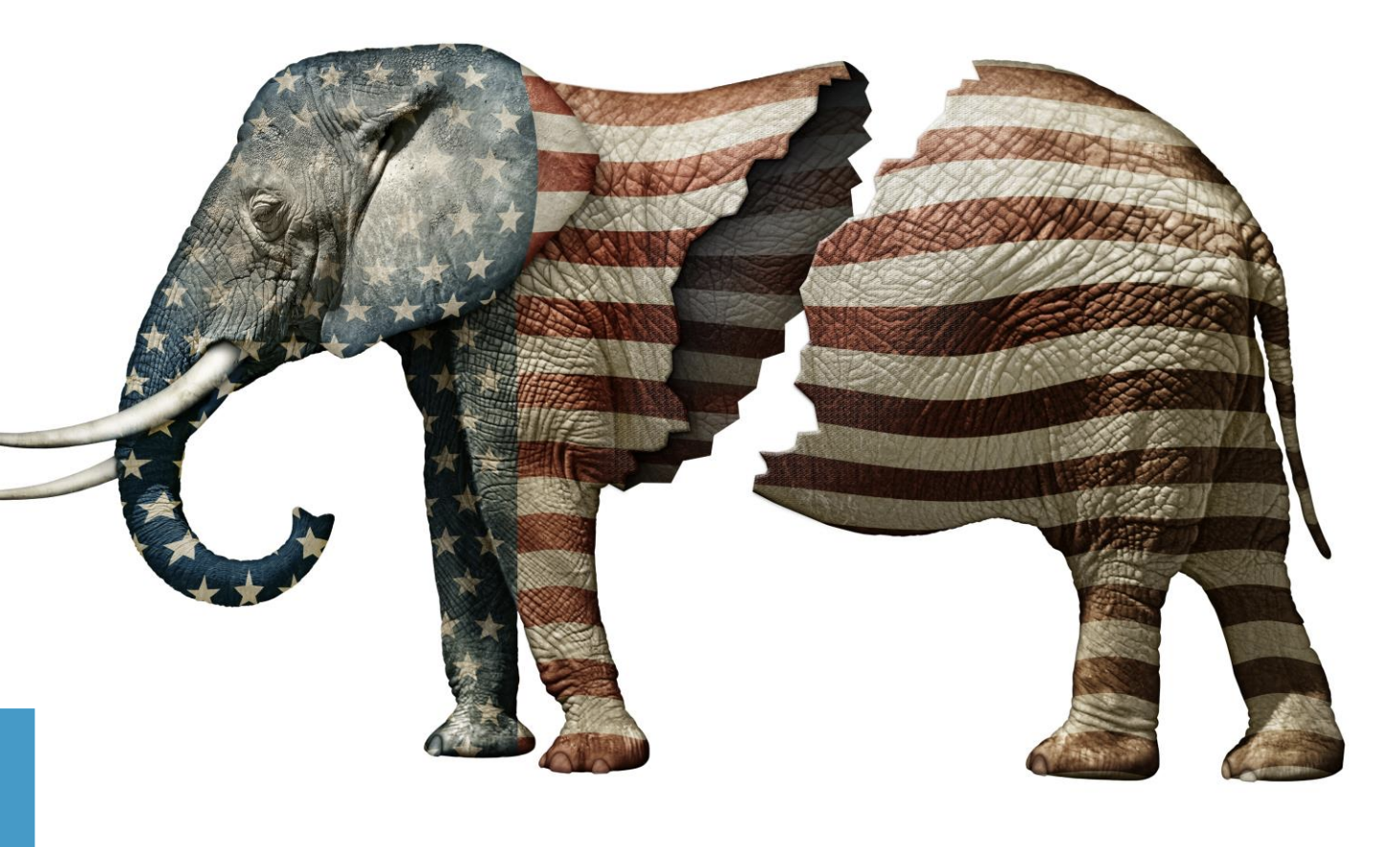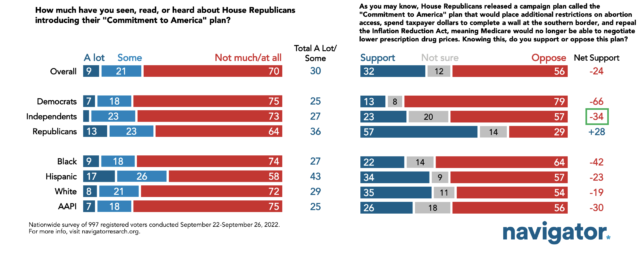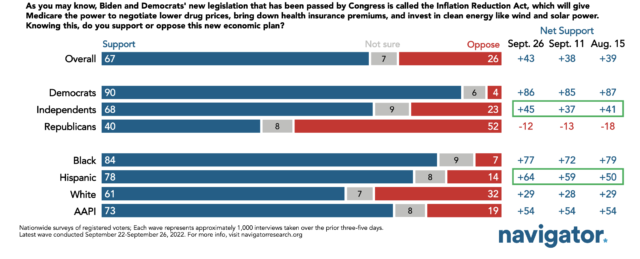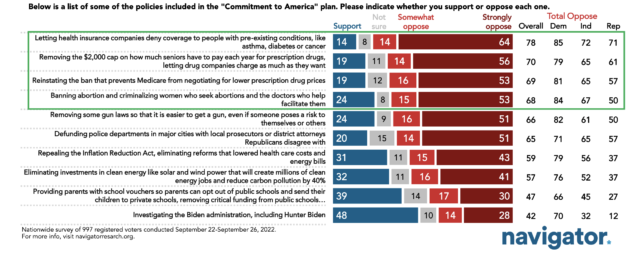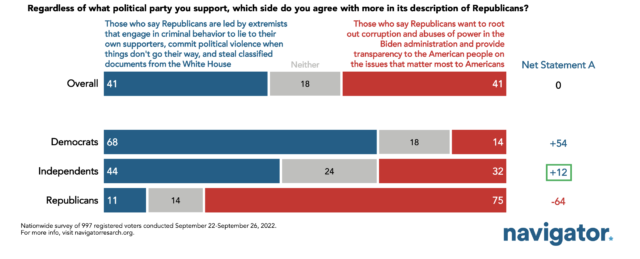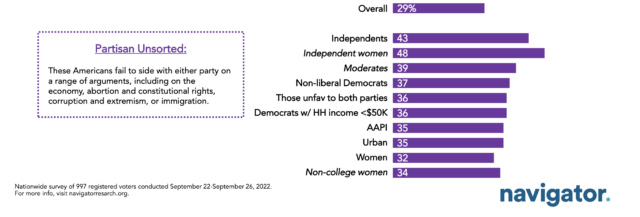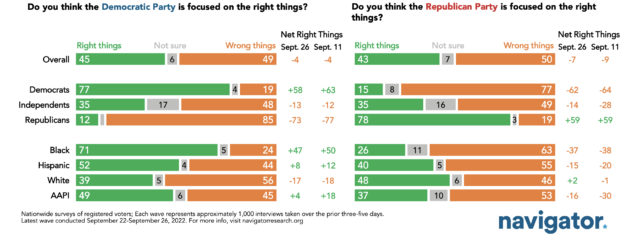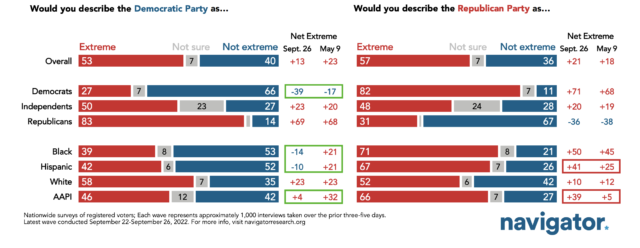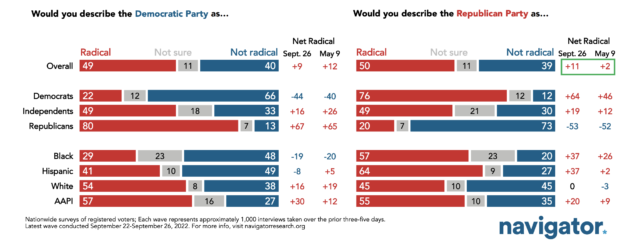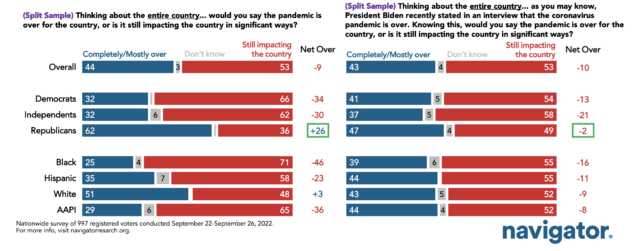- Few Americans are hearing about Republicans’ “Commitment to America” plan, but when they learn more, majorities are opposed while Biden and Democrats’ Inflation Reduction Act remains broadly popular.
- The least popular policies in Republicans’ “Commitment to America” plan include allowing insurance companies to deny coverage to people with pre-existing conditions, policies that would raise prescription drug costs, and abortion bans.
- Americans increasingly see the Republican Party as “extreme” and “radical,” while a declining share say the same of Democrats.
Very Few Hearing “A Lot” About the GOP “Commitment to America” Plan and Most Are Opposed When Learning More
Only three in ten (30%) report hearing at least some about House Republicans’ “Commitment to America” plan; after learning more details, all partisan and racial groups except Republicans oppose the plan by double-digit margins.
Two in Three Americans Continue to Support Biden and Democrats’ Inflation Reduction Act
A large majority of independents (68%) and majorities across race and ethnicity continue to support the Inflation Reduction Act.
- Among Hispanic Americans, support for the legislation has increased a net 14 points since mid-August (from +50 to +64).
Most Unpopular Policies: Denial of Coverage for Pre-Existing Conditions, Prescription Drug Cost Increases, Abortion Bans
Majorities of Americans “strongly oppose” letting insurance companies deny coverage for pre-existing conditions (64%), removing the prescription drug price cap for seniors (56%), preventing Medicare from negotiating drug prices (53%), and banning abortion (53%).
Americans Are Divided on Whether Republicans Want to Fight Corruption or Whether They Are Extreme
By a 12-point margin, independents say Republicans are “led by extremists” and “commit political violence when things don’t go their way” (44%), rather than that Republicans “want to root out corruption and abuses of power” and “provide transparency” (32%).
Nearly Three in Ten Americans Are Not Sure Which Party to Agree With on a Range of Issues
Nearly three in ten Americans don’t know which party to side with on a range of issue arguments, with independents most likely to say neither party on at least one issue (43%) – including 48% of independent women – as well as 39% of moderates, 37% of nonliberal Democrats, and 36% of those unfavorable to both the Democratic and Republican Parties.
Americans Continue to View Democrats as More Focused on the “Right Things” Than Republicans
Black Americans (net +47 right things), Hispanic Americans (net +8), and AAPI Americans (net +4) continue to see Democrats as more focused on the right things than the wrong things, while only white Americans see the Republican Party as focused on the right things (net +2 right things).
Republicans Are Increasingly Seen as More Extreme, While Democrats Are Increasingly Seen as Less Extreme
There has been a 10-point decline in the share who say the Democratic Party is extreme since May (from net +23 extreme to net +13), largely coming from an improvement among their own partisans (from net -17 to net -39 extreme among Democrats).
- Republicans, on the other hand, are viewed as slightly more extreme than in May (from net +18 extreme to net +21).
A Growing Share View the GOP as Radical
Perception of Democrats as radical has largely remained unchanged across the electorate (from net +12 radical to net +9), though among independents it has decreased by 10 points (from net +26 to net +16).
- At the same time, perceptions of Republicans as radical have increased by 9 points since May overall (from net +2 to net +11).
Republicans Agree the Pandemic Is Over for the Country – Except for When Joe Biden Says It Is
When asked simply whether the pandemic is over for the country or not, majorities of Republicans (62%) say it is over while majorities of Democrats say it is ongoing (66%); with inclusion of Biden’s statement that the pandemic is over, a plurality of Republicans move to say the pandemic is actually still ongoing (49%) while just 54% of Democrats then say the pandemic is ongoing.
About The Study
Global Strategy Group conducted public opinion surveys among a sample of 997 registered voters from September 22-September 26, 2022. 100 additional interviews were conducted among Hispanic voters. 87 additional interviews were conducted among Asian American and Pacific Islander voters. 100 additional interviews were conducted among African American voters. 100 additional interviews were conducted among independent voters
